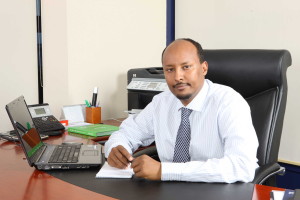The High Court has issued an injunction preventing Barclays Bank from closing the account of British-Somali money transfer operation, Dahabshiil Holdings. Barclays threatened in May to suspend business with Somali money transfer companies within two months over concerns that remittances are being used to launder money and fund terrorism.
In the absence of a conventional banking infrastructure in the Horn of Africa nation, Somalis living in the UK and elsewhere use remittance companies to send money to their families. Dahabshiil Holdings Ltd. is far and away the most popular of these and success for Barclays could have sounded the death knell for any prospect of the service continuing operations. The company is also the service of choice for transfers of money on behalf of international aid agencies, NGOs and other organisations working in the country who have to pay staff and buy equipment and supplies. Other smaller companies have already lost their bank accounts, forcing them to operate through intermediaries or cease operations altogether. Dahabshiil’s account with Barclays was the last one still operating in a major British bank.
Following the Court’s ruling, which remains in force pending an appeal from Barclays, which would probably be heard next year, Dahabshiil’s CEO, Abdirashid Duale, said: “We are extremely pleased that the Court has recognised the strength of our case. It is also good news for all our customers who are reliant on us to transfer money safely to the Somali region and all other countries in which we operate.”
Duale said Dahabshiil challenged Barclays’ decision on the grounds that the British bank was creating an unfair competitive situation. He explained to journalists: “Barclays Bank said they want to get out of the sector. They have decided to close hundreds of money service accounts, but they want to keep certain companies. So that’s why we believe by keeping certain companies and not treating them equally it’s against the competition, and that’s why we, on the advice of our legal team, we went to the Court and asked the judge that Barclays Bank cannot close our account on the competition ground.”
Earlier this year, after Barclays gave notice of its intentions in May, Duale said: “The British government has often called on Somalis to help themselves. This is what we are determined to do. But we can’t rebuild everything if the key component of the region’s economic infrastructure is knocked out. That is a fact.”
Barclays has said that it will appeal against the ruling, saying in a statement: “Barclays made a legitimate decision to exit these businesses based upon the well-known risks of money laundering and terrorist financing in the money service business sector. The risk of financial crime is an important regulatory concern and we take our responsibilities in relation to this very seriously.”
Barclays’ critics say that if the bank succeeds in cutting off its services to money transfer companies, UK-based Somalis will be forced to resort to informal and unregulated channels, which would inevitably proliferate to fill the void. This would ultimately increase the risk of money going to terrorist organisations. Concern about this prospect prompted the government to convene a meeting of all agencies concerned, resulting in an action plan, including asking the Department for International Development (DFID) to work on setting up a “safe corridor” pilot for Somalia along the lines of a system already working for Pakistan. This would track payments right through from sending, through clearing, to the recipient eventually getting their money. Such a plan is not likely to be in place for at least a year, however.
According to UN estimates, $500 million of the $1.5 billion Somalia receives each year through remittances sent from overseas is sent through Dahabshiil. Much of this money contributes towards efforts to rebuild following decades of civil war.
Oxfam, which has campaigned against the account closure, also welcomed the ruling, although it pointed out that the injunction was only temporary.
“The ruling provides a small window of opportunity,” said Ben Phillips, Oxfam’s director of campaigns and policy. “However, this does not solve the problem – a long-term fix is needed.”
Degan Ali, Executive Director of Adeso, a humanitarian and development NGO working in Somalia, described the injunction as “very good news for Somalia, for Somalis living abroad and for anyone who cares about the country’s future.”
“That being said,” she added, “we should not lose sight of the bigger issue, and we need to continue to work towards finding a long-term solution.










